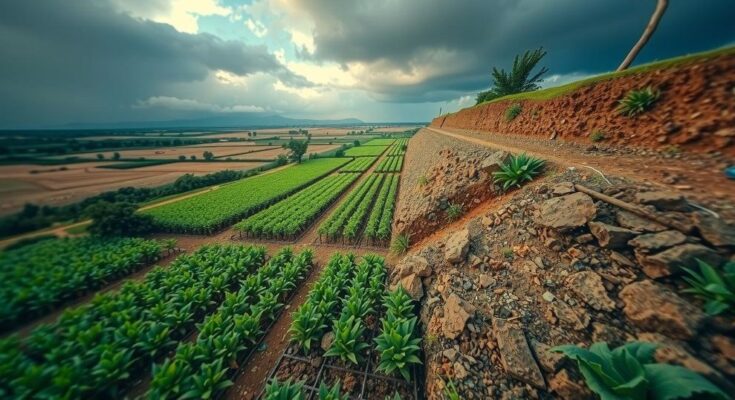Climate change significantly jeopardizes Egypt’s agricultural sector, threatening water resources essential for food production, particularly due to its desert climate and reliance on the Nile. Research indicates declines in crop yields, increasing water demands, and an urgent need for adaptive strategies. The Egyptian government is focusing on innovative methods to enhance resilience against climate impacts while ensuring food security through sustainable practices.
Egypt faces significant threats to its food security and agricultural sector due to climate change, exacerbated by the country’s hot desert climate, limited rainfall, and dependency on the Nile River for water resources. Prime Minister Mostafa Madbouly recently underscored these challenges at the New Valley Agricultural Exhibition, where discussions centered on the impact of climate change on farming practices, especially in arid regions.
Research documents from the World Bank highlight that climate change adversely affects agricultural activities across low-input farming systems in developing countries, with Egypt identified as particularly vulnerable. The dependency on the Nile, which is essential for food production, is under threat posed by climate fluctuations, leading to increased water scarcity. Since the early 1990s, Egypt’s per capita water availability was reported below the international threshold, intensifying fears regarding future water scarcity and its implications for agriculture.
As climate conditions worsen, projections indicate a potential increase in water demand for summer crops by 16% by 2050, while yields of crops such as rice and soybeans are expected to see considerable declines. Conversely, some crops like cotton may benefit under higher temperature scenarios. Without adequate adaptation measures, the agricultural productivity of Egypt is at risk, leading to dire consequences for food security and the farming sector itself.
To combat these challenges, the Egyptian government emphasizes the need for adaptation strategies such as adjusting sowing dates and enhancing management practices. The introduction of more resilient crop varieties, investing in advanced irrigation methods, and improving land management are pivotal strategies outlined in Egypt’s Intended Nationally Determined Contributions (INDC) report.
Moreover, developing robust institutional frameworks for managing climate-related crises and enhancing biodiversity in agriculture are critical to bolstering food security. Integrated efforts to advance climate-resilient farming systems and sustainable practices are essential to mitigate the impacts of climate change effectively. While the Egyptian Vision 2030 initiative prioritizes these issues, the urgency for comprehensive research and investment in adaptation strategies cannot be overstated.
In summary, Egypt stands at a crossroads regarding its agricultural future, where proactive adaptation to climate change is imperative. By implementing innovative and sustainable practices, the nation can better safeguard its food security and ensure the resilience of its agricultural systems.
The topic of climate change in Egypt’s agricultural sector presents crucial information about the historical and geographic factors contributing to vulnerabilities in food production. Situated in an inherently arid climate, Egypt’s reliance on the Nile River for water underscores the urgency of addressing water scarcity issues intensified by climate change. Various scholarly reports and government initiatives provide insights into the challenges faced by the agricultural sector and propose adaptive strategies necessary for maintaining food security.
In conclusion, the repercussions of climate change pose an imminent threat to Egypt’s agricultural viability and food security. With decreasing water resources and projected declines in crop yields, the necessity for effective adaptation strategies is paramount. By embracing innovative agricultural practices, enhancing water management, and prioritizing sustainable development initiatives, Egypt can navigate these challenges and build a resilient agricultural future.
Original Source: egyptianstreets.com




